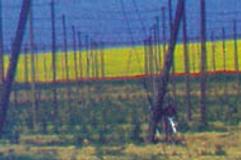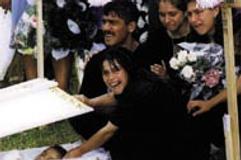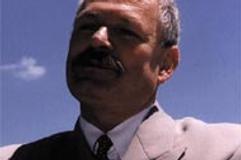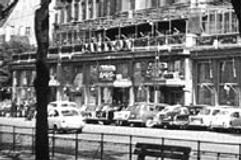Archive of articles - August 1998, page 3
If you desire to read an old article, use the search bar or select the publication date.
Shipbuilder wins tender
Slovakia's sole shipbuilder, Slovenské Lodenice Komárno (SLK), achieved a significant success in August when Bulgarian privatization authorities announced that the SLK's project had won a tender to buy a shipyards in Ruse, on the Danube River.SLK strategy department director Jiri Dlouhý told The Slovak Spectator that the Slovak project was chosen in the tender over a bid from an unspecified German company also interested in acquiring the Bulgarian shipbuilder, Lodenica Ruse."We started to look at shipyards in Ruse in March last year and then we worked out a project which was submitted in the tender after conditions were announced in February," Dlouhý said. "The Bulgarian authorities did not announce the name of the German company, so neither can we."
Hop growers struggle to sell crop
Although beer is still Slovakia's number-one alcoholic drink, with an average annual consumption of 94.8 liters per capita in 1997, Slovak hops farmers are sobering up to strong competition from cheaper, better foreign crops. Struggling to sell their produce both at home and abroad, hops growers across the nation have started to cut back production.The cultivation of hops in Slovakia has plummeted in the past three years, dipping from 1,200 hectares grown in 1995 to the current level of 450 hectares, of which the majority is controlled by large private companies. Evidence of hops growers' troubles can be witnessed along country roads: Usually teeming with hop plants this time of year, many fields lie fallow for the first time in recent memory.
Flood waters kill 48 in eastern Slovakia
"People were screaming "help! help!", but we couldn't help them because there was too much water," recalled František Husar. "The water was taking everything."Husar, along with his wife and two children, was able to climb onto the roof of his house to escape the violent flash floods that ravaged eastern Slovakia on July 20, but 42 of Husar's Jarovnice village neighbours were not so fortunate. After the flood waters receded, Husar continued, "men were just walking down the street and finding corpses. Death was everywhere."The Sabinov district of the Prešov region and its Romany (gypsy) citizens accounted for all but two of the 48 dead, and suffered the brunt of a catastrophe which officials called the worst natural disaster in the country's recent history. "I have never seen anything this before and neither have people in their 70s or 80s," said Dušan Majerčák, chairman of the District Flood Commission in Sabinov. "There has never been a flood like this one."
Presidential powers transferred Slovakia averts potential constitutional crisis
Parliamentary deputies unanimously approved a constitutional amendment on July 14, transferring key presidential powers to the speaker of parliament and moving Slovakia back from the brink of a constitutional crisis.The bill hands the speaker of parliament, a position currently held by Ivan Gaśparovič, three of the four remaining presidential powers not assumed by Premier Vladimír Mečiar after former President Michal Kováč's term in office ended on March 2. The presidential post has remained vacant since Kováč's departure.The most important of the three transferred powers is that allowing Gašparovič to receive the resignation of an outgoing government. Political analysts had feared that if this power remained in limbo until after September's general elections, Slovakia would have wound up with a constitutional standoff between a new parliament and a non-removable government.
US aid and voter education
Non-government organisations running voter education programs in Slovakia have three options to secure financial support from the American government - the United States Information Service (USIS), the US Agency for International Development (USAID), or the National Endowment for Democracy (NED)."Programs supported by the United States Government are non-partisan," said William Schofield, Charge d'Affaires of the American Embassy in a public statement. But deciding which programs are "non-partisan" and then how much suppport to give each project may be fraught with risk.According to Paula O. Goddard, USAID representative in Slovakia, the term 'non-partisan' is defined very strictly by the agency. "To us, non-partisan [means] simply emphasizing participation in the election but not emphasizing any positions or any candidates," she said.
Slovenská Poisťovňa privatized
Slovenská Poisťovňa (SP), the country's biggest insurer, held the first round of a stock subscription on August 3 and 4 amidst furious allegations that companies close to the government of Prime Minister Vladimír Mečiar were being allowed to privatize the state insurer. Officials at the National Property Fund (FNM), hitherto the majority owner of SP, denied the charges, but since the FNM did not take part in the increase of the insurer's capital stock, private shareholders are indeed set to gain the upper hand.Although SP has promised to publish complete results of the stock subscription after all three rounds have been completed (by August 21 at the latest), data released to the public so far show that the FNM is not participating in the subscription, and suggest that the FNM's share of SP will eventually drop from 50.5 percent to 40.4 percent.
Tragedy sparks political sniping
While the residents of Prešov and Košice regions were beginning to repair their flood-damaged homes and lives, many Slovak politicians were using the disaster to score pre-election points. A media skirmish was fought over how much each party was donating to victims, while dozens of politicos turned up on site to express sympathy and lend a hand.The first Slovak politician to visit the stricken area was Mikuláš Dzurinda, the opposition Slovak Democratic Coalition (SDK) leader. Accompanied by a few party colleagues, Dzurinda arrived on July 22, bringing food, medical supplies and clothing for the survivors. After his visit, Dzurinda appealed through the media to the SDK election campaign committee in Prešov region to interrupt its campaign activities and provide vehicles and technical equipment for the rescuers operating in the stricken areas. Hard on Dzurinda's heels was Jozef Migaš, chairman of reformed communist SDĽ party.
Election commission bars two parties
The August 7 meeting of the newly-formed Central Election Commission produced several controversial decisions, leading commission members to exchange accusations of narrow partisanship. The commission refused on to register 2 of the 18 parties and movements that had applied to contest the election, citing mistakes in their candidates lists, but allowed a Hungarian party whose list had the same faults to register. Meanwhile, the largest opposition party, the SDK, was permitted to contest the election by a margin of only one vote, despite having a fault-free list.In the aftermath of the meeting, commission delegates dropped any pretense of making common cause for a smooth election process. "[SDK delegate Ján] Čarnogursky is lucky as hell that the SDK was registered at all," said Ján Šárovecký, a delegate representing the ruling HZDS party of Premier Vladimír Mečiar. Šárovecký later told independent Radio Twist that the HZDS would appeal the SDK registration to the Supreme Court on the basis of the fact that the SDKwas a coalition rather than a party.
Around Slovakia
Deputy receives unwanted showerMan with Radioactive Material DetainedMinister gives vulgar giftNudes fight prudesHZDS conference wows thousands
More Romany migrants leave
More than 500 Slovak Romanies seeking asylum have fled to the United Kingdom over the past two months. Claiming racial persecution, the emigrants are joined by almost 10 new arrivals every day. But British officials view the exodus as economically rather than politically motivated, and say that most Slovak Romanies will be forced to return to their home country.Although six Slovak Romany families were granted asylum by the British authorities in early June, the new "White Paper" on UK immigration policy makes asylum procedures "faster, fairer and firmer" for victims of human rights abuses but much harder for those seeking a better standard of living.
Dilapidated Carlton to regain its shining beauty
Bratislava's Hviezdoslavovo Square is alive with tourists in the summer, and with the Slovak opera house and fountain setting the tone, is a vibrant and elegant part of the downtown core. But on the south side of the square, a scruffy, neglected hulk of a building attracts the curiosity of passers-by. It is the Hotel Carlton, in disuse these seven years past, but a venue that once played an important role in the city.What can be seen of the hotel nowdays has been fronting the square since 1913. The current building was erected on top of a older and smaller hotel, which had stood there from 1846. The hotel's shining facade was allowed to deteriorate in the late '60s, while the core structure has been crumbling since then. But a bright future is now dawning on the hotel, because a serious reconstruction project is underway at the Hotel Carlton.
Judicial Consciousness in Slovakia. Slovak judges still searching for independence
Prior to the "velvet divorce" in January 1993, I was contacted by the National Center for State Courts in Williamsburg, Virginia, USA, and asked if I would go to Czechoslovakia to work with a group of judges in their efforts to create a truly independent judiciary. Having served as the president of the American Judges Association, the largest independent judges' association in the United States, I had some experience with the value of a judicial association fighting for the rights of judges. Therefore, I was assigned to a team consisting of two other judges and one federal prosecutor who previously had spent time in Bratislava.
Polls divided on vote
Two polls released in July by the independent Nazory and Focus companies have given a sharply divided picture of what is going on in the hearts and minds of Slovak voters. The former group gave current government parties almost 36% of popular support, while the latter produced a figure of 29.9%.The Focus agency produced figures on July 17 to show that support for Premier Vladimír Mečiar's ruling HZDS party had risen over 2% since June to hit 25.9% of eligible voters. The main SDK opposition party, on the other hand, had fallen 1.2 points to 21.2% over the same period. The agency gave the Party of Civic Understanding (SOP), led by popular Košice mayor Rudolph Schuster, a 14.2% tally, while the reformed communist SDĽ party and the Hungarian Coalition Party both fell below 10%, scoring 9.8 and 9.9% respectively. Of the 11 other parties contesting the elections in September, only the ruling coalition member Slovak National Party (7.2%) had more than the 5% of popular support needed to secure parliamentary representation.
Current account deficit skyrockets
Slovakia's current account deficit soared to 38.4 billion Slovak crowns ($1.1 billion) for the first half of 1998, almost 11 percent of the country's GDP. The Ministry of Economy, however, took the news in stride, predicting confidently that the troubling figures should decline to 8% of GDP by year's end. Slovak macroeconomic analysts were less optimistic, saying that a figure of 10% of GDP was more realistic.Analysts ascribed the deficit to high investment imports, expansive fiscal policy, high domestic consumption and continuing problems in the Slovak export sector."The unpleasant developments in the first half of 1998 in the current balance deficit were caused by higher investment imports," said Martin Barto, an analyst with ING Barings investment bank. Barto also stressed that weak export figures played an important role in the deficit figure. "Slovak exports are not able to handle competition from Asian and eastern European countries. And 20% of our exports go to the Czech Republic, where purchasing power decreased in the first half of 1998," he said.
- 3 free things to do in Bratislava in the next seven days
- Weekend: What to make of Easter in Slovakia
- US giant pulls plug on Slovak factory, axing 137 jobs
- When to shop over Easter: Opening hours for supermarkets in Slovakia
- Hundreds of people ousted from Bratislava’s Volkswagen
- News digest: Finns air unseen video of Fico shooting, PM’s bloody jacket driven away by minister
- Slovakia's latest basketball star is destined for great things in the USA
- He said he wanted a guitar and ran away. About the time a famous NHL team picked up an unknown Slovak
- Hundreds of people ousted from Bratislava’s Volkswagen
- 3 free things to do in Bratislava in the next seven days
- Weekend: What to make of Easter in Slovakia
- News digest: Finns air unseen video of Fico shooting, PM’s bloody jacket driven away by minister
- When to shop over Easter: Opening hours for supermarkets in Slovakia
- US giant pulls plug on Slovak factory, axing 137 jobs
- Prices surge in Slovakia as inflation hits 15-month high
- Cockroaches and crumbling toilets greet seven-year-old battling serious virus
- “Return not,” the ocean cried. But I returned for her
- Hundreds of people ousted from Bratislava’s Volkswagen
- US giant pulls plug on Slovak factory, axing 137 jobs
- Prices surge in Slovakia as inflation hits 15-month high
- 3 free things to do in Bratislava in the next seven days
- When to shop over Easter: Opening hours for supermarkets in Slovakia
- Weekend: What to make of Easter in Slovakia
- German shoemaker Lowa joins wave of factory closures in Slovakia
- A café in an ice cellar, sand dunes and a flower shop at the border
- “Return not,” the ocean cried. But I returned for her
- German shoemaker Lowa joins wave of factory closures in Slovakia
- Hollywood turns Slovak highlands into high-speed playground Video
- Chicken Jockey! Chicken Jockey! Chicken Jockey! Video
- Hundreds of people ousted from Bratislava’s Volkswagen
- Danish shoemaker to shut Slovak factory, axing 650 jobs in fresh blow to struggling region
- Prices surge in Slovakia as inflation hits 15-month high
- Slovakia's latest basketball star is destined for great things in the USA
- News digest: Finns air unseen video of Fico shooting, PM’s bloody jacket driven away by minister
- 3 free things to do in Bratislava in the next seven days
- He has been disciplined for delays. Now he will lead Slovakia’s top court
- Slovak startup Upfan declares war on fake tickets
- Smer MEP tells Slovaks to learn the EU’s rules – so they can break free from Brussels
- Too small to cope alone, Slovak villages are teaming up
- Top 10 events in Bratislava for foreigners More articles ›






